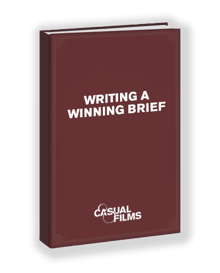There is one lesson in productivity that is so incredibly valuable, it's amazing it isn't taught to anyone working in any business on day one. For day one lessons it's up there with the location of the loos or whether the cookies in the cupboard are Scary Pete's personal stash or not. It's benefit has the potential to be far more lasting...

So what is it?
It comes from Steven Covey's 7 Habits of Highly Effective People. It is that you should:
“Begin with the end in mind.”
It’s in extremely valuable idea and it works with almost everything. From meetings to wedding planning to project management. Taking a moment to think about what you are trying to achieve before you begin a process is an extremely useful and valuable thing to do. It means you know exactly where you’re heading before you start towards it.
Why are we mentioning it here? Because it’s surprising how useful an exercise it is for video commissioners. Why are you creating or commissioning a project? What are the goals and how will you accomplish them? What specific, measurable, achievable realistic and time framed action or response are you looking to generate with your project. We know that’s ‘SMART’ goal setting, which we will cover here soon. The point here though is that you need to consider exactly what you want to achieve – what success looks like - before you even start. I know this may seem a bit obvious, but you would be amazed at how many people get blinded by the idea of ‘wanting a video’ without thinking about exactly what they want the video to do. We’ve worked on a few projects where we get very close to the end of the process, and a senior client representative says, “Hang on a second, why are we doing this?”
You need to be completely clear on your reasoning. Clarity of focus and purpose is what defines effective corporate content. It is too easy to start before taking the time to agree among the stakeholders what the video / video project will be used for.
Resist the temptation here to seek consensus among stakeholders by including too many disparate goals. Many people will use the fact that you are creating a video to include other messaging. Bear in mind that everything included in the final output that doesn’t specifically work to achieve the goal you set out will detract from its effectiveness. This may sound overly severe – of course films can be about more than one thing. You need to stop your film’s effectiveness from being watered down by including too many messages.
This is why the briefing stage is so important. It takes time, skill and discipline to agree on and write a really good, clear brief. This can be an extremely valuable experience, as it requires an alignment among the different stakeholders in the process. Having agreed on the content, you should write a brief that is clear and concise, but that is readable and engaging. You should try to bring what you are after to life, as the more effectively you can do this, the more likely you are to capture the imagination of someone who might know a potential subject. So many of the briefs that we receive as a company are dull, verbose and complicated. This makes sense, as they are very specific business documents, but they tend to elicit better responses if they are clear and have a little life to them.
THE BRIEFING DOCUMENT
Once you have all of the goals for the project ironed out, you can fill in a briefing document. The briefing
document is the bible for the project. It should include all the objectives for the production: the audience, desired action (what success looks like), budget, timeframe, delivery channels and key stakeholders. You should take the
time to do one of these for every project you do, even if you’re a
little lighter on the information on the basic ones.
The time taken to make sure that you have thought a bit about it will save you far more time, money and annoyance in the long run. Almost every project that doesn’t end up as desired can be traced back to an incomplete or poorly thought out brief. It doesn’t need to be super complicated, but it will help you make more-effective films.

If you’d like to know more, you can follow the link to download our Writing a Winning Brief Worksheet. This will help you to fill in a brief more accurately and thoroughly, giving you the perfect jumping off point for whatever your next project is.



.svg)
